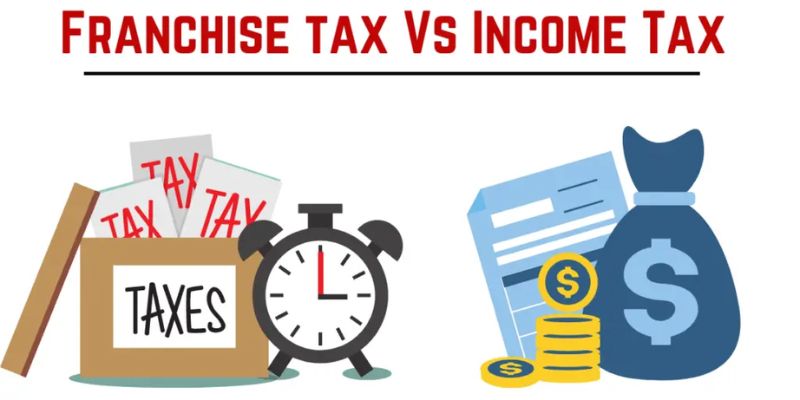Do you know what a Franchise Tax is? For many businesses, the answer to this question often remains in mystery – but it shouldn't. Every business pays some taxes, and the franchise tax is important for companies registered as corporations or LLCs (Limited Liability Companies).
Understanding your franchise tax responsibilities helps ensure compliance with laws and regulations and can save you significant money in the long run. In this blog post, we'll tackle everything related to franchise taxes - from explaining what they are, how much they cost, when you need to pay them, and where to find more information.
By better understanding this key element of corporate taxation, you'll be well on your way toward running a successful business!
Franchise Tax Definition

The franchise tax is a state-level tax that businesses registered as corporations or LLCs must pay yearly. It's assessed based on the amount of capital the business has and can be calculated differently, depending on where you live. In some states, it's a capital stock or privilege tax.
Understanding Franchise Taxes
Franchise taxes are an important source of revenue for states that require them, meaning it's in the business owner's best interest to be aware and comply. But what exactly is a franchise tax, who needs to pay it, how much does it cost, when do you need to pay it, and where can you find help with compliance?
First, franchise taxes are imposed on entities like corporations and limited liability companies (LLCs) located within certain states as a fee for the right to exist as a legal entity or conduct business within their jurisdiction.
Alabama, Arkansas, California, Delaware, Georgia, Illinois, Louisiana, Mississippi, New York, North Carolina, Oklahoma, Tennessee, and Texas are the states that now impose these taxes. Fraternal organisations, NGOs, and specific LLCs are all eligible for exemptions from these taxes.
The amount of the franchise tax can vary significantly between states. Generally, it's either based on a business's profits or assets, with some states allowing businesses to choose their basis for taxation. Some states also offer discounts if the company has made capital investments within their jurisdiction.
When it comes to deadlines for payment, most states have an annual filing requirement due in April or May, with payments due by June 30th each year. Nonpayment of taxes is a criminal offense, so businesses mustn't miss their deadlines.
If you need help understanding your franchise tax obligations or compliance, there are resources online to help. Many states have detailed website information explaining franchise tax requirements and filing deadlines. Private tax professionals can also offer guidance and advice tailored to your business needs.
Understanding your franchise tax obligations is essential to comply with your state's rules and regulations. This will help you avoid fines or other penalties and may also provide potential savings in the long run. Taking the time to familiarize yourself with the basics of franchise taxes now will save you headaches later on down the road.
Franchise Tax Rates
Some state governments require Franchise taxes which vary in cost from $175 to $250,000 or more. To help you understand how much franchise tax you may owe, we will explain the different rates for Delaware and California.
Delaware Franchise Tax Rates
Delaware franchise tax rates can range from $175 to $250,000 annually, depending on the corporation's size and filing status. Limited partnerships (LP), limited liability companies (LLC), and general partnerships formed in the State of Delaware must pay an annual tax of only $300.
California Franchise Tax Rates
In California, small businesses have a layered system of taxes that includes a potential franchise tax. Corporations and LLCs that choose to be treated as corporations are not subject to the franchise tax, but S-corporations, LLCs, LPs, and limited liability partnerships (LLPs) are all subjected to different rates of the California franchise tax.
The rate for S-corporations is $800 or 1.5% of their net income, whichever is greater. This fixed fee for LLCs is set at $800 annually. The franchise tax will be replaced by California's corporate income tax for the same LLCs that choose to be taxed as corporations.
Franchise taxes for LLP and LP entities vary, but they must pay at least $800 in franchise taxes annually.
Understanding the different franchise tax rates allows you to fulfill your legal obligations and save money. You must stay current with current tax laws and regulations to avoid any deadlines or get hit with penalties or fees.
Special Considerations
A franchise tax can vary from state to state, so it's important to understand the specific rules in your location. Here are some special considerations when it comes to franchise taxes:
- One of the most important criteria for determining whether a business is subject to franchise tax is whether they are registered as a corporation or LLC. If you are not registered as either, you may be exempt from paying this type of tax.
- The amount of the franchise tax may also depend on factors such as the company's total assets and liabilities, gross receipts, income, and other information on its financial statement.
- Certain states also offer credits and exemptions that can reduce your overall franchise tax burden. For example, some states allow credits for taxes paid to other states or municipalities.
- Depending on the state, there may also be additional filing requirements related to franchise taxes, such as providing proof of payment and filing reports with the state's taxation department.
- Sometimes, you may need to register with the state to pay your franchise tax. This is usually done through an online process or by mail.
- Finally, depending on your business type, it's important to note that additional fees may apply if you choose not to file a return or complete the required paperwork correctly and on time.
Franchise Tax vs. Income Tax

Franchise and income taxes are two types your business may need to pay. States assess franchise tax as a way for businesses to pay for the privilege of operating in that state.
It's an annual tax based on your business's net worth or capital, which means it isn't dependent on your profits from the year. On the other hand, income tax is based on your company's profits and is typically due quarterly. Most states impose franchise and income taxes with varying rates across different industries.
Both taxes should be taken seriously and paid on time — failure to do so can lead to hefty fines and penalties, not to mention a damaged reputation. In addition, some states have rules that require businesses to file a franchise tax return even if they don't owe anything.
Example of a Franchise Tax
To illustrate how franchise tax works, let's consider an example. Let's say your business is incorporated in Texas and has a net worth of $1 million. The state imposes a franchise tax rate of 0.5%, so you must pay $5000 to the state each year.
FAQs
Who must pay franchise tax in Texas?
Any business incorporated in Texas must pay franchise taxes, regardless of the type of company or its size. This includes corporations, LLCs, and other entities.
Do I have to file a franchise tax return?
In most states, you must file an annual franchise tax return even if you don't owe anything or are exempt from paying taxes.
What happens if I don't pay my franchise taxes?
Most states consider nonpayment of franchise taxes as a criminal offense. You could face fines and penalties for not filing your returns on time. It is best to be aware of deadlines and take the necessary steps to stay compliant with laws and regulations to avoid issues.
Conclusion
The franchise tax is a state-mandated corporate taxation system wherein businesses must pay a fee for the privilege of incorporation in that state. Different states have different franchise tax requirements, and it behooves businesses operating in multiple states to understand and ensure compliance with each jurisdiction's franchise tax laws. Being aware of your state's franchise tax regulations is an important part of being a responsible business owner.



